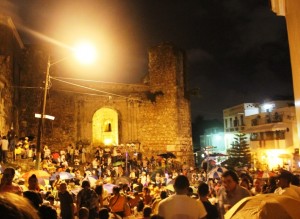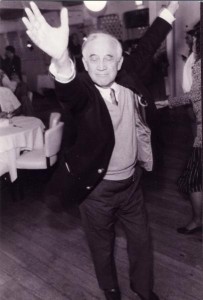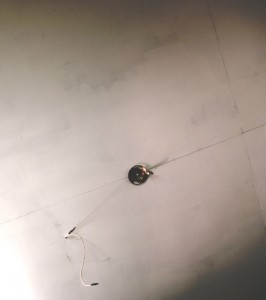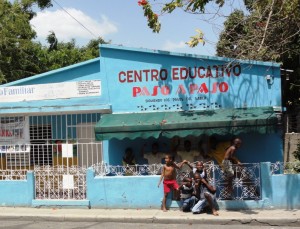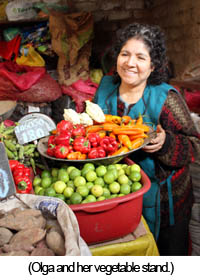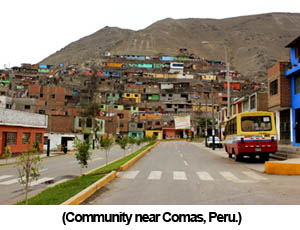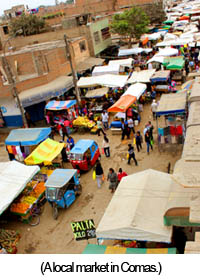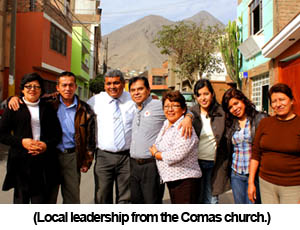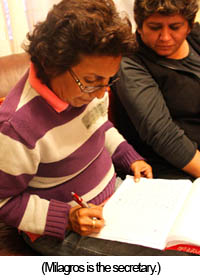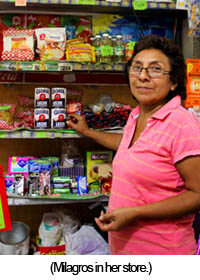Aaron Roth – HOPE International – “Believe in What You Sell” – August 2012
Hi everyone, we had a successful day of business training for school owners last week even though Hurricane Isaac was picking up speed here in the Dominican. This upcoming weekend I’ll be heading to Haiti for the first time. Please pray for safety and our work there with the savings groups. Also, as a reminder, I’m planning to stay here in the DR until October 11th to help out with a HOPE event here before returning to the States this fall. Do please continue to support me through the fall if you feel led.
- Download this email as a pdf: Aaron Roth – Aug 2012 Update.pdf
 Blog and Support Page: www.AaronRoth.net
Blog and Support Page: www.AaronRoth.net- HOPE International Worldwide – www.HOPEinternational.org
- Newsletter Archive: AaronRoth.net – Monthly Newsletters
It’s easy to sell something that you believe in.
If you’ve ever had an experience selling, whether it’s lemonade from your lemonade stand, magazine subscriptions door to door, or fundraising booths at a public event, you know you have had a lot more success when you truly believe the product you’re selling is good and people want it. On the other hand, when you have to peddle some sort of snake oil that you don’t believe in, sales are hard to come by. It’s just a simple rule of business and of life.
Riding around on a motorcycle taxi through La Romana and San Pedro inviting school directors to our business training workshop was probably one of the easier sales calls I had to make in my life. For example, I would show up with a letter of invitation, and explain to the administration that they were invited to a four hour training  session led by a CPA with 15 years of experience working with small, affordable, private Christian schools. Immediately their faces showed interest and they were expecting the huge price to come next, but I continued on, explaining that with his financial advice, he would walk us through how to prepare an operational budget for the upcoming school year. We’d have coffee, drinks, and sandwiches. Best of all, it would be free.
session led by a CPA with 15 years of experience working with small, affordable, private Christian schools. Immediately their faces showed interest and they were expecting the huge price to come next, but I continued on, explaining that with his financial advice, he would walk us through how to prepare an operational budget for the upcoming school year. We’d have coffee, drinks, and sandwiches. Best of all, it would be free.
You can imagine the look of disbelief on their faces when I mentioned the word “free.” Even more, I went on to say that we are doing a series on business trainings this upcoming fall covering areas of financial sustainability in our Biblical business training curriculum. Part of our program with doing microlending to small, Christian schools in economically poor areas includes doing Biblical business training and teacher training using the AMO program: www.amoprogram.com
It was an easy sell. I was met with smiles and handshakes and a gracious disbelief of the free offer. And then, on training day, we had 43 people attend from 26 schools.
Success.
Maybe, if you’ve read my previous newsletters you think that this will be the point where I break in with the bad news. Well, don’t worry, there isn’t. Not even the rain of Tropical Storm Isaac stopped us. It was an amazing experience to see the good inputs turn into great results.
Katia from Centro Educativo Agape (God’s Love Education Center) said “I wish I had heard this information four years ago when I started my school.” Haidy from Colegio Paso a Paso (Step by Step School) expressed, “Now, this makes sense why my income has to stretch to cover the expenses at the end of the month, I should be charging 10-15%  more.” It was a simple recipe: quality material, easy to understand examples, relevant training for school leaders.
more.” It was a simple recipe: quality material, easy to understand examples, relevant training for school leaders.
Economically, these are poor schools. They charge anywhere from $7 to $12 a month for students to attend and even to parents who struggle to afford this money, they pay it, because they know the alternative is unsatisfactory. Their children will be crammed into a room with 50 other students in the public school, and they won’t learn anything. No parent would want that for their child.
But for us, as an American organization, when we think about aiding this economic situation, to subsidize the education for these Dominican children would simply be ineffective and very expensive. It’s not feasible for us to fund the 6,600 public schools or the 4,200 private schools. We don’t have the money, but maybe more importantly, when we prevent local leaders like Katia or Haidy from being able to teach students from their own knowledge and skills, modeling good behavior and hard work, we prevent raising up local leaders, thereby limiting long term development and success. We do business training because we believe in local leaders to accomplish the role of education in the communities where they live.
 It really makes me think about a key point, through all of my mission work down here: It matters what we believe, it matters what we do, and what we dedicate ourselves to.
It really makes me think about a key point, through all of my mission work down here: It matters what we believe, it matters what we do, and what we dedicate ourselves to.
When we try to build up our own success, that’s a small victory. But when we turn and seek out these educators, leaders, and entrepreneurs, and partner with them, they win, their teachers win, their students win, the whole community wins and so do we. When we believe that there are 43 leaders who can educate their children well, it will change what we say and the confidence we feel when we ride around La Romana and San Pedro inviting schools to a business training. I believed, and they believed as well.
 For me, I gave up a lot to be here in the Dominican Republic to serve with HOPE International and Esperanza International. I don’t make a salary here. I have been supported by my church, friends, and family. They believed in what I was doing because I believed in it myself.
For me, I gave up a lot to be here in the Dominican Republic to serve with HOPE International and Esperanza International. I don’t make a salary here. I have been supported by my church, friends, and family. They believed in what I was doing because I believed in it myself.
This is still what I believe in. I believe that those affected by economic poverty deserve an opportunity to climb up and out of the depths of financial despair, and I believe fundamentally that there are better ways of doing economic development. Here at HOPE, we believe that to ensure long-term success, we have to give a hand up, not a handout. When you give people the right tools, when you partner with them in the right way, when you believe in the right things, you will see success far beyond what you could have ever anticipated.
He replied, “. . . I tell you the truth, if you have faith as small as a mustard seed, you can say to this mountain, ‘Move from here to there’ and it will move. Nothing will be impossible for you.” (Matthew 17:20)
I pray that you will believe what is good and true and that you will speak boldly from what you believe.
Blessings to you and your family,
-Aaron





 astronauts that your youth leaders deemed rugged enough to survive a few test orbit missions from your summer camp launch pad.
astronauts that your youth leaders deemed rugged enough to survive a few test orbit missions from your summer camp launch pad. people a hand up, not a hand out. We make loans to those who live in economic poverty to help them start sustainable businesses to help them improve their economic situation on their own.
people a hand up, not a hand out. We make loans to those who live in economic poverty to help them start sustainable businesses to help them improve their economic situation on their own.
 electricity, and just 2 months ago, they got their first paved road.
electricity, and just 2 months ago, they got their first paved road.


